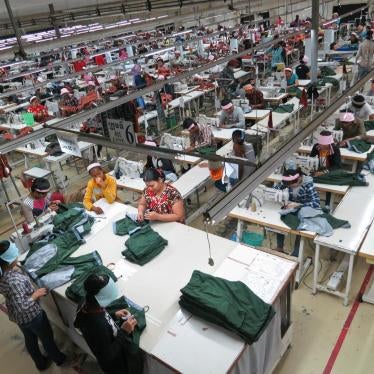Human Rights Watch has conducted research on child and forced labor in global supply chains for over two decades. We have interviewed thousands of workers, employers, government officials, and other affected individuals in the context of global supply chains in agriculture, the garment and footwear industry, fishing, mining, and construction. In 2017 we submitted comments and suggestions through the consultative process undertaken by both the Joint Standing Committee on Foreign Affairs, Defence and Trade,[1] and the Attorney-General’s office,[2] including several of our reports on modern slavery in apparel, seafood, jewelry, and other industries around the world.
Human Rights Watch appreciates the Australian government’s desire to build upon its existing commitments to fight modern forms of slavery, and to take steps to become a global leader in eliminating trafficking, slavery and slavery-like practices, and the worst forms of child labor from its supply chains.
We are encouraged by the incorporation of certain recommendations made during the public consultation phase, such as the application of the reporting requirements to Commonwealth agencies and the creation of a free and accessible repository of modern slavery statements. We also commend the inclusion of mandatory criteria in reporting that includes descriptions of company operations and supply chains, assessment of risks, and steps to remediate any instances of modern slavery identified.
However, we are concerned that the current bill still falls short of an effective response to the widespread and growing role of modern slavery in Australia’s supply chains.
Based on our research and expertise on modern slavery in global supply chains, we submit the following recommendations to the Modern Slavery Bill 2018:
1. Reduce the threshold of application in Part 1, Section 5 to AU$25 million
Under Part 1, Section 5, a “reporting entity” required to submit a Modern Slavery Statement is limited only to those companies and other entities with an annual consolidated revenue of at least AU$100 million, limiting the scope of application to approximately 3000 entities.[3] Other regulations in Australia, such as the financial reporting requirement under the Corporations Act of 2001, set the threshold for financial reporting at AU$25 million, which is a more appropriate cutoff that would capture more of the business and other entities with global supply chains.
2. Publish a list of covered companies
There is currently no provision in the Bill that would require the government to publish a list of entities required to submit a Modern Slavery Statement, allowing a company that failed to comply with the law to keep that hidden. In the interest of transparency, we urge the Committee to add a provision in Part 3, Section 18, stating that “The register must contain a list of companies required to submit a Modern Slavery Statement.”
3. Mandate due diligence across the supply chain
Part 2, Section 16 of the Bill currently requires companies to report their risk assessment and remediation activities, but it does not mandate due diligence. Requiring companies to conduct due diligence would mean the systematic identification, prevention, mitigation, and remediation of modern slavery in their supply chains rather than simply a “checking the box” exercise. Without clear guidelines and requirements for mandatory due diligence, reporting under the proposed law would be limited to information at the discretion of each company, limiting its usefulness and impact in addressing modern slavery. We urge the Committee to add a section after Section 15 in Part 2 of the Bill titled “Mandatory due diligence in supply chains” that provides minimum guidelines for due diligence that is proportional to the size of a company’s supply chain and modern slavery risk. The risk assessments need to include identifying risks from the company’s business model and purchasing practices that may contribute to human rights abuses in its supply chain. A recent survey by the International Labour Organization across different sectors showed how a company’s business model and purchasing practices contribute to labor abuses in its supply chain.[4]
4. Include financial penalties
New reporting requirements can present challenges to a corporation of any size, for which the Department of Home Affairs has committed to providing support to all businesses through a specialized unit. This assistance will hopefully create a collaborative business environment in which companies are encouraged and supported to comply. However, in cases when a company cannot or will not file a modern slavery report containing all the required information, the use of financial penalties will provide additional incentive toward compliance. We strongly urge the incorporation of financial penalties by adding a section at the end of Part 2 outlining the consequences for failure to make a timely and complete submission, including a range of financial penalties.
5. Create a civil course of remedy
The Bill currently contains no legal consequences for companies that fail to comply with the reporting requirement. When companies choose not to follow reporting requirements at the expense of workers in their supply chain, the government should ensure that workers around the world have a clear path to remedy and justice, including access to Australian courts. The Committee should add a section in Part 2 of the Bill creating civil liability for harms resulting from failure to comply. The Australian law could draw on examples like the French “duty of vigilance” law in establishing a civil course of action for workers harmed by companies that fail to identify and address forced labor and other conditions amounting to slavery in their supply chains.[5]
---------
[1] “Australia: Submission to the Joint Standing Committee on Foreign Affairs, Defence and Trade Inquiry into Establishing a Modern Slavery Act in Australia,” Human Rights Watch, May 19, 2017, https://www.hrw.org/news/2017/05/19/australia-submission-joint-standing-committee-foreign-affairs-defence-and-trade.
[2] “Australia: Recommendations for the proposed model of the Modern Slavery in Supply Chains Reporting Requirement,” Human Rights Watch, October 19, 2017, https://www.hrw.org/news/2017/10/19/australia-recommendations-proposed-model-modern-slavery-supply-chains-reporting.
[3] The Parliament of the Commonwealth of Australia, House of Representatives, “Modern Slavery Bill 2018,” Explanatory Memorandum, Appendix A, http://parlinfo.aph.gov.au/parlInfo/download/legislation/ems/r6148_ems_9cbeaef3-b581-47cd-a162-2a8441547a3d/upload_pdf/676657.pdf;fileType=application%2Fpdf (accessed July 19, 2018).
[4] International Labour Organization, “Purchasing practices and working conditions in global supply chains: Global Survey results,” INWORK Issue Brief No. 10, June 2017, http://www.ilo.org/wcmsp5/groups/public/---ed_protect/---protrav/---travail/documents/publication/wcms_556336.pdf (accessed July 19, 2018).
[5] European Coalition for Corporate Justice, “French Duty of Vigilance Law – English translation,” December 2016, https://www.business-humanrights.org/en/french-duty-of-vigilance-bill-english-translation (accessed July 19, 2018).








